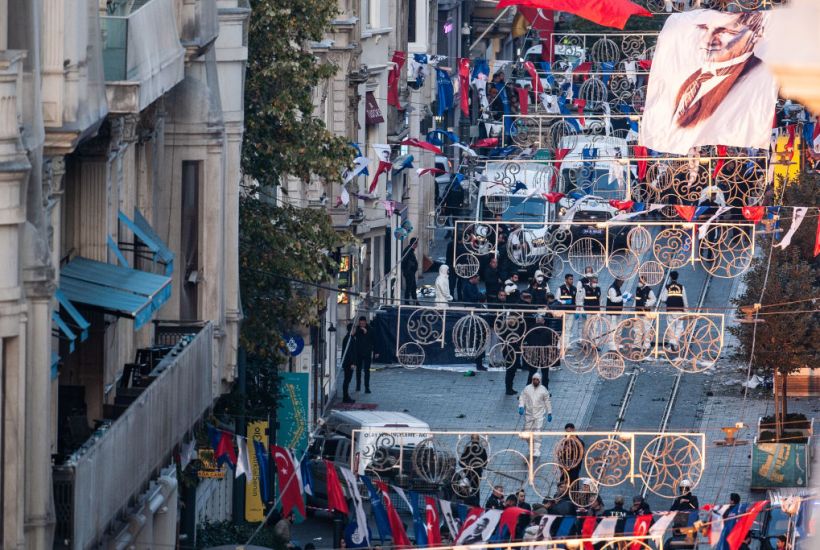Istiklal Avenue is a picture of chaos at the best of times. Istanbul’s answer to Oxford Street, the bustling pedestrian area is lined with upmarket shops, cafes and overpriced kebab stands. Groups of men sit out till late at night on benches drinking tea and playing chess, while families pushing buggies jostle with tourists for ice cream and pastries.
On Sunday, though, that chaos gave way to outright panic when an explosion ripped through the heart of the city, Europe’s largest and home to more than 15 million people. One shopper captured the moment the fireball erupted in the packed crowd, sending women and children scrambling to escape. Meanwhile, pictures taken from offices overlooking Istiklal show mangled bodies and scorched paving stones.
According to Turkish President Recep Tayyip Erdogan, this ‘treacherous attack’ has killed at least six people, with a further 81 believed to have been injured. The hunt for the perpetrators, he announced as the dust settled, will be swift and decisive. Since then, 46 suspects have reportedly been detained in connection with the bombing. Among them is a young woman that officials say ‘placed the bomb that caused the explosion’ and who was allegedly captured on CCTV moments before the detonation.
Ankara has wasted little time in pointing the finger. Interior Minister Suleyman Soylu declared on Monday that the attack was perpetrated by the outlawed Kurdistan Workers Party (PKK) and its Syrian Kurdish allies, the YPG. According to him, the order was given from their headquarters in Northern Syria.
With an economic crisis raging at home, Erdogan is eager to put the blame for the issues facing Turkey on those abroad
For years, Turkish forces have been fighting running battles against militias in the breakaway region, where Kurdish groups had strengthened their hand following the defeat of ISIS. They had been planning a new offensive against them in recent weeks. Meanwhile, just across the border inside Turkey, security agencies have long been cracking down on what they say are dangerous terrorist rings among their own 15 million-strong Kurdish population, targeting activists and journalists with alleged links to separatist movements.
However, the standoff has also fueled a deepening divide between the country and the West, as Erdogan regularly accuses the US of supporting the Marxist PKK. Last year, he blasted President Joe Biden’s White House as being ‘behind’ the militant Kurdish group after it executed 13 Turkish hostages in Iraq, summoning Washington’s ambassador over the incident.
‘A lot of people in Turkey do feel that Western powers are out to crush their country, peel off its territory and destroy it as a great power,’ Professor Lisel Hintz, an expert on Eurasian politics at Johns Hopkins University, told The Spectator. ‘And the behaviour of the EU in arming Kurdish groups in Syria adds to that sense.’
American officials have defended military and political support for the Kurds on the basis that they were one of the most effective forces fighting both ISIS and the brutal government of Syrian dictator Bashar Al Assad. Ankara has repeatedly argued that same support is being used to perpetrate terror attacks on its soil. Sunday’s Istiklal bombing has only intensified that rhetoric, and drawn more of America’s partners into the fierce row. Security chief Soylu claims that, had the alleged bomber not been apprehended, she and her co-conspirators would have been smuggled to safety in neighbouring Greece.
Tensions between the two countries have skyrocketed in recent months, with Ankara insisting that US hardware is being used by Athens in its ‘occupation’ of contested islands in the Aegean Sea. Turkish warplanes have repeatedly violated their neighbour’s airspace, while their commanders lodged a protest after an armed Greek anti-air launcher locked on to one of their jets. Despite the fact both are Nato members, analysts say the prospect of a serious incident is high. Turkish politicians and the media frequently claim their nation is being targeted by a Western coalition that wants to see it weakened and broken up.
At the same time, an emboldened Erdogan is increasingly finding himself on the opposite side of other conflicts to the US and its allies. It has stepped up its presence in the Middle East, North Africa and the Caucasus, while refusing to impose sanctions on Russian oil and gas. Over the summer, Ankara threatened to veto the applications of Sweden and Finland to join Nato unless they took ‘concrete steps’ to extradite alleged Kurdish terrorists living there back to Turkey to face trial. Using this leverage he secured a deal, despite fears they would be treated unfairly.
‘America has been killing people by abandoning them from the moment the plane took off as they escaped from Afghanistan,’ Soylu said at the opening of a school named after a Turkish naval officer ‘martyred’ in Syria on Sunday, hours before the blast. ‘They said they would bring democracy to Iraq, peace to Afghanistan. But the world sees these things for what they are.’
As Erdogan prepares to face voters next June and seek an unprecedented third term in office, he is increasingly portraying himself as the only one who can stand up to this coalition of enemies, internal and external. And, with an economic crisis raging at home, sending inflation soaring to above 90 per cent and seeing the price of basic goods and groceries more than double, he is eager to put the blame for the issues facing Turkey on those abroad.
While Istanbul grieves for the innocent people killed and maimed in Sunday’s attack, the political fallout is only just beginning to be felt. It seems clear that the resulting shockwaves will once again shake the fragile truce between Turkey and the West.
The post The Istanbul bombing will deepen Turkey’s rift with the West appeared first on The Spectator.
Got something to add? Join the discussion and comment below.
Get 10 issues for just $10
Subscribe to The Spectator Australia today for the next 10 magazine issues, plus full online access, for just $10.



















Comments
Don't miss out
Join the conversation with other Spectator Australia readers. Subscribe to leave a comment.
SUBSCRIBEAlready a subscriber? Log in